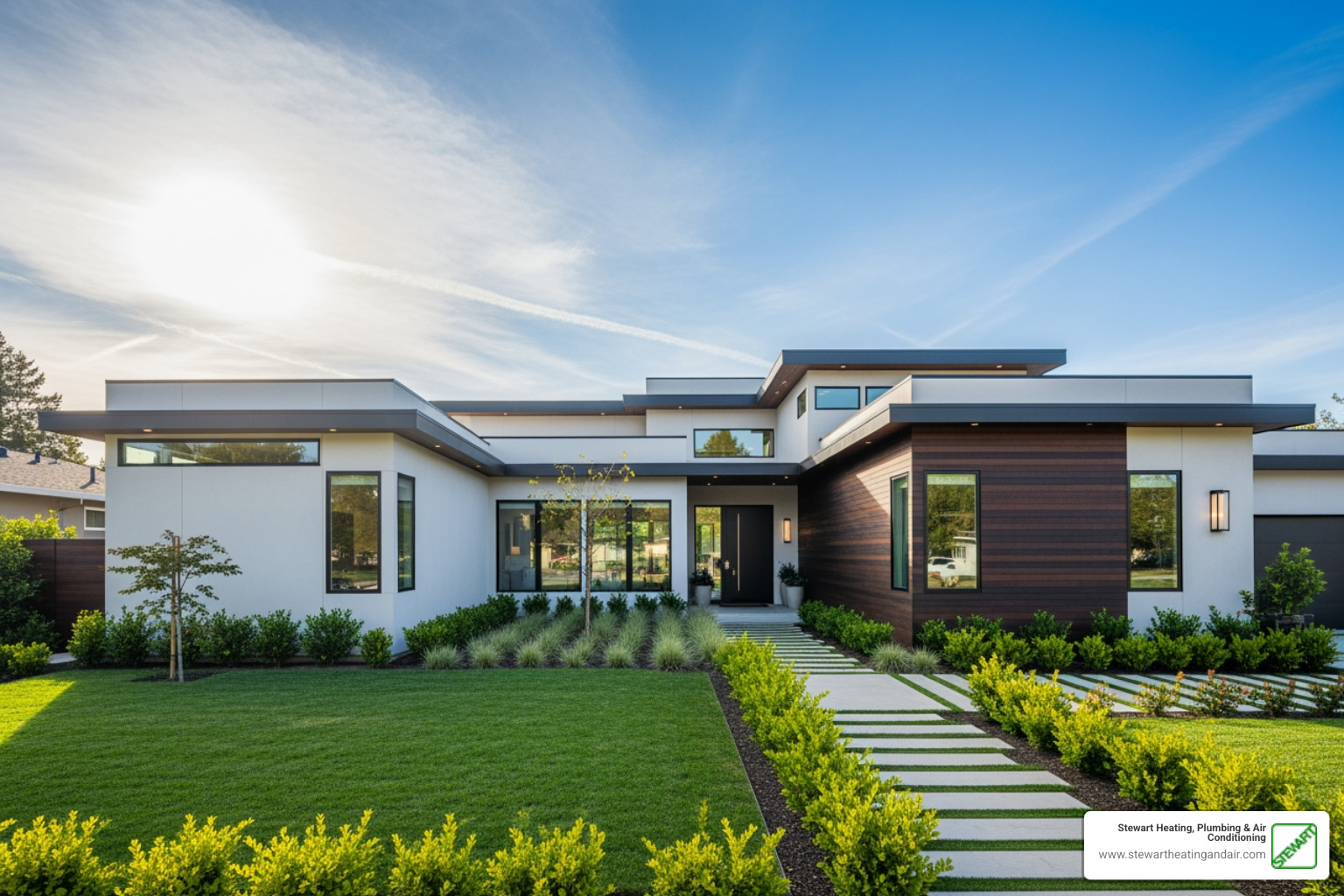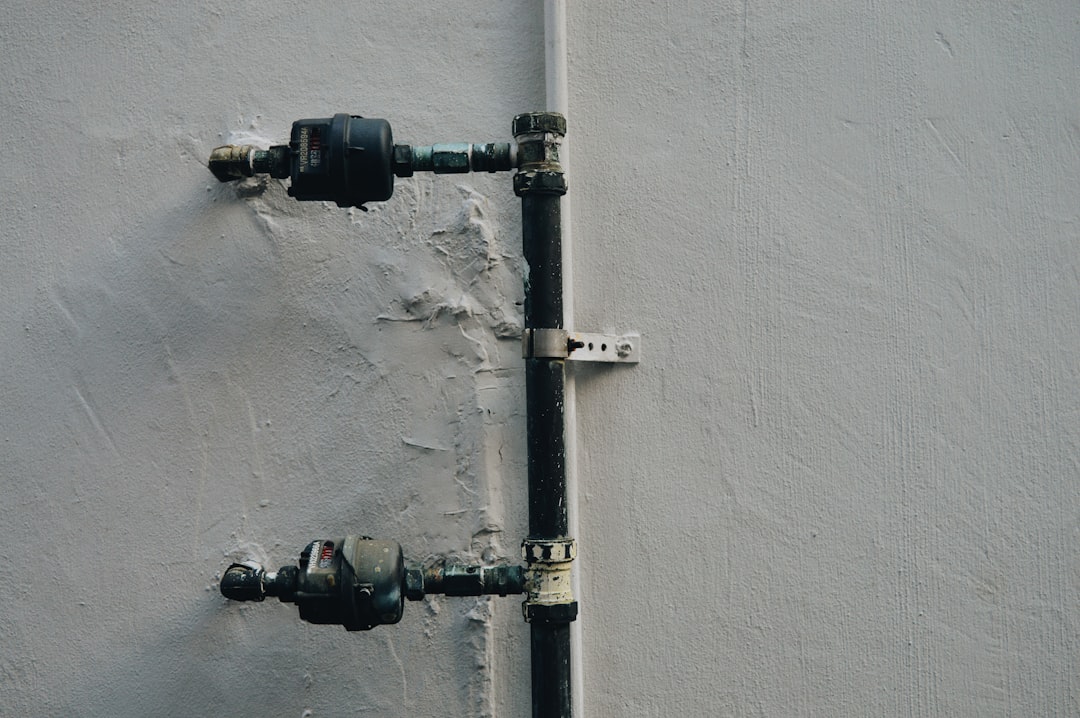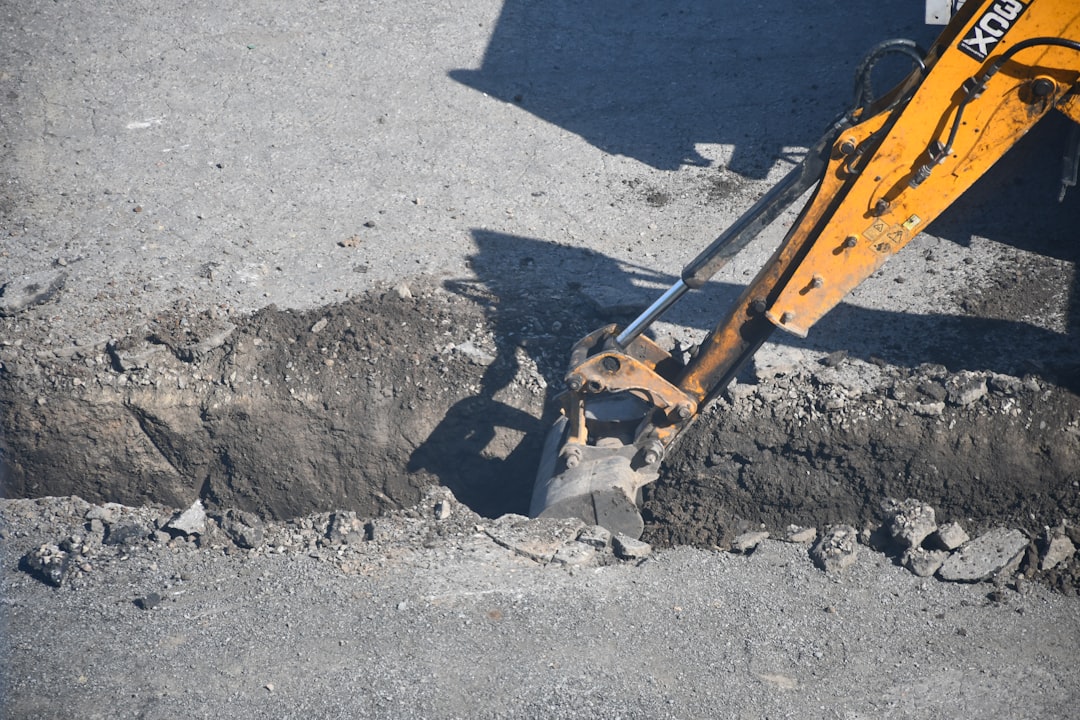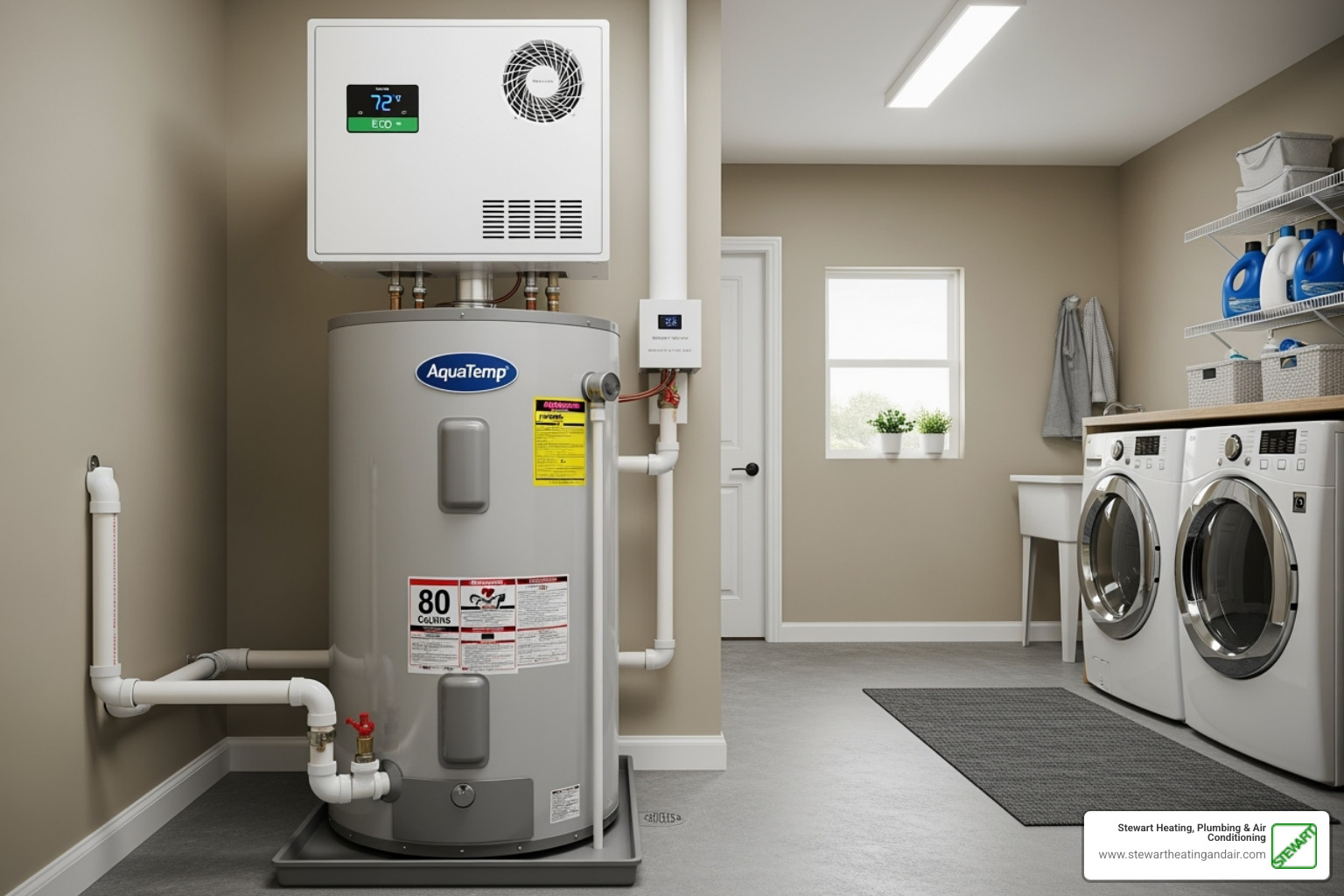
Why Heat Pump Water Heaters Are Revolutionizing Home Water Heating
A heat pump water heater uses electricity to move heat from surrounding air to water, making it 2-3 times more energy efficient than conventional electric resistance water heaters. Here's what makes them different:
Key Features:
- Technology: Moves heat instead of generating it (like a refrigerator in reverse)
- Efficiency: Up to 4x more efficient than standard electric models
- Savings: Can save a family of four approximately $550+ per year
- Types: Available in integrated (all-in-one) and split-system models
- Power: 240V or 120V plug-in options available
When was the last time you thought about your water heater? For most homeowners, it's tucked away in a garage or basement, forgotten until that dreaded moment when your shower turns icy cold.
Your water heater uses more energy than your refrigerator, dishwasher, clothes washer, and dryer combined. In fact, water heating accounts for about 12% of your home's total energy consumption - making it the second-largest energy expense after heating and cooling.
Traditional water heaters work by creating heat through combustion (gas) or electrical resistance. Heat pump water heaters work smarter by moving existing heat from the surrounding air into your water tank. This fundamental difference is why they're often called "hybrid electric water heaters" - they combine heat pump technology with backup electric elements.
The technology isn't new - it's the same proven system found in refrigeration and air conditioning units. But for water heating, it's a game-changer that can slash your energy bills while reducing your carbon footprint.
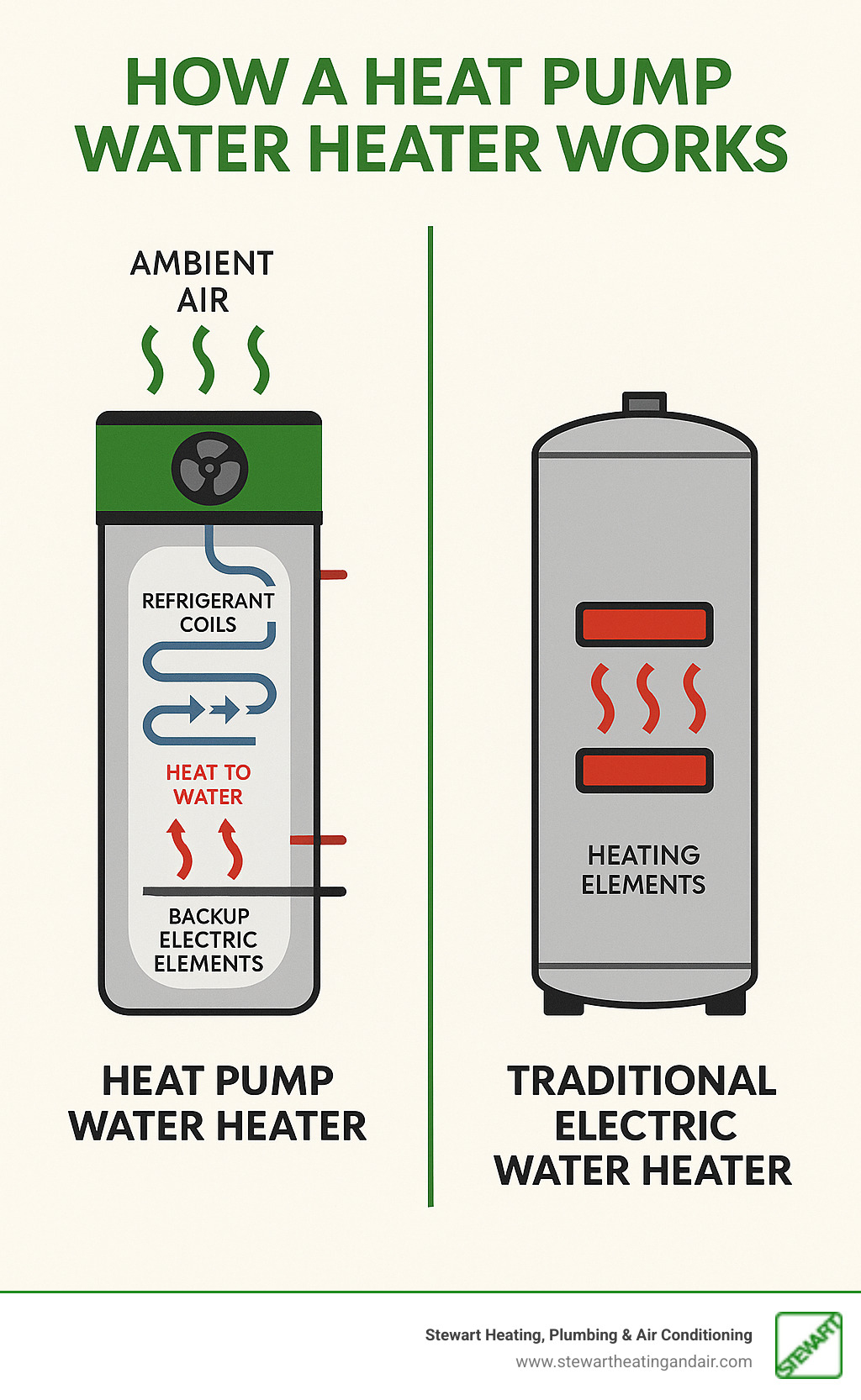
How a Heat Pump Water Heater Works vs. Traditional Models
Think of your refrigerator keeping your milk cold on a hot summer day. Now flip that concept upside down – that's exactly how a heat pump water heater works! Instead of pulling heat out of your food, it captures warmth from the surrounding air and transfers it into your water tank.
This brilliant approach to heat transfer is what makes these units so special. While traditional water heaters work hard to create heat, heat pump models work smart by simply moving heat that already exists in the air around them. It's like having a refrigerator in reverse working 24/7 to heat your water.
Gas water heaters burn fuel to create flames that heat your water directly. Standard electric resistance heaters work like giant toasters, using electric coils to generate heat. Both methods require a lot of energy because they're starting from scratch every time.
Heat pump water heaters use what's called hybrid electric technology. They primarily rely on the super-efficient heat pump system, but they're smart enough to kick in backup electric elements when you need extra hot water fast or when the air gets really cold.
Want to see this amazing technology in action? Check out this helpful video: Watch "ENERGY STAR Water Heaters Mean BIG Savings!"
The Core Differences in Technology
Here's where the magic happens – it's all about the efficiency principle. Traditional water heaters use combustion vs. electricity to generate heat from scratch. Gas units burn fuel and send hot exhaust gases up the flue. Electric resistance models convert every bit of electricity directly into heat, which sounds efficient but really isn't.
A heat pump water heater flips the script entirely. Instead of heat generation vs. heat movement, it uses a tiny amount of electricity to power a compressor and fan that can move three to four times more heat energy than they consume. Think of it as getting four dollars of heating for every one dollar of electricity you spend!
This approach brings serious safety benefits too. Since there's no fuel burning involved, you completely eliminate the risk of carbon monoxide poisoning – a real concern with gas appliances. No flames, no combustion gases, no worries about gas leaks. Just clean, safe, efficient water heating.
Comparing Your Options Side-by-Side
When you're shopping for a new water heater, you'll want to understand a few key numbers. The Uniform Energy Factor (UEF) tells you how efficiently your water heater converts energy into hot water – higher numbers mean more savings on your energy bills. The First Hour Rating (FHR) shows how many gallons of hot water you can get during your busiest hour.
| Feature | Heat Pump Water Heater | Standard Electric Water Heater | Gas Water Heater |
|---|---|---|---|
| Efficiency (UEF) | High (3.3 - 4.0+) | Low (0.9) | Moderate (0.6 - 0.8) |
| Annual Fuel Cost | Low (approx. $104 - $160) | High (approx. $400 - $600+) | Moderate (approx. $200 - $300) |
| First Hour Rating (FHR) | Good (60 - 100 gallons) | Good (55 - 72 gallons) | Good (60 - 85 gallons) |
| Power Source | Electricity (moves heat) | Electricity (generates heat) | Natural Gas/Propane (generates heat) |
| Installation Needs | Electrical, space for air, condensate drain | Electrical | Gas line, venting |
| Safety Concerns | None (no combustion) | None | Carbon monoxide, gas leaks |
| Noise Level | Similar to refrigerator (low hum) | Silent | Low hum, burner noise |
| Lifespan | 10 - 15 years | 10 - 15 years | 10 - 15 years |
The lifespan of all three technologies is similar – you can expect about 10 to 15 years of reliable service with proper maintenance. However, the day-to-day operating costs tell a very different story. While a heat pump water heater might cost more upfront, those dramatically lower monthly energy bills mean it often pays for itself in just a few years.
The Triple Win: Energy Savings, Lower Bills, and Eco-Friendly Operation
When you choose a heat pump water heater, you're not just upgrading an appliance – you're making a decision that benefits your wallet, your home's energy efficiency, and the environment all at once. It's what we love to call the "triple win," and here's why it matters so much.
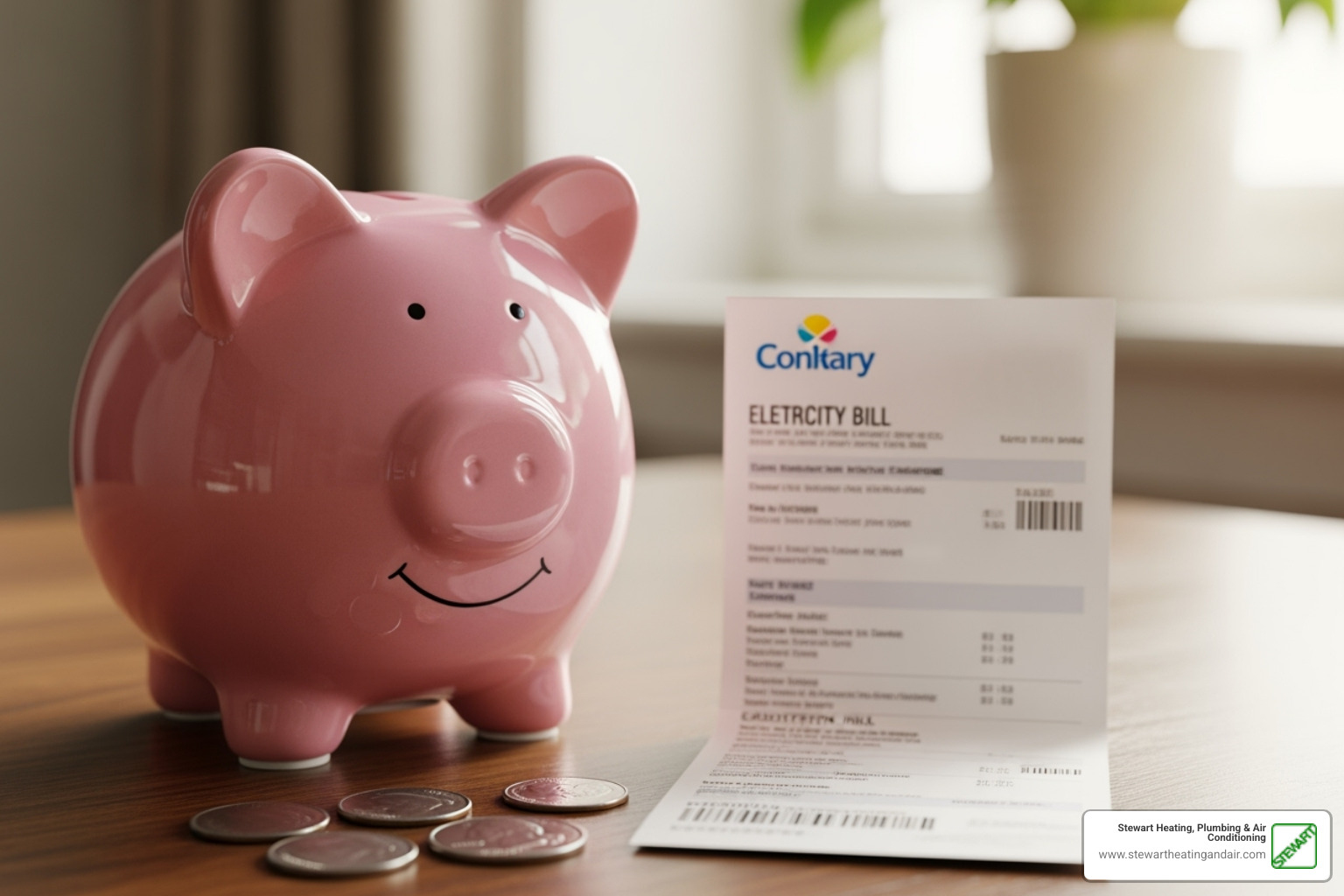
The energy savings alone are remarkable. A heat pump water heater can be up to four times more efficient than a standard electric water heater. Think about that for a moment – you're getting the same hot showers and clean dishes while using a fraction of the energy. It's like having your cake and eating it too.
Those impressive energy savings translate directly into real money staying in your pocket every month. We're talking about meaningful reductions in your utility bills that add up year after year. It's essentially like getting a raise without asking your boss!
But perhaps most importantly, you're doing something genuinely good for the planet. By dramatically cutting your home's energy consumption for water heating, you're reducing greenhouse gas emissions and helping create a cleaner future for your kids and grandkids.
Calculating Your Potential Savings
Let's talk real numbers because that's where things get exciting. A typical family of four can save around $550 per year on their energy bills compared to sticking with a standard electric resistance water heater. Over the lifespan of the unit, you could be looking at savings that exceed $5,600.
The payback period – that's the time it takes for your energy savings to cover the higher upfront cost – is often just three to four years. After that, it's pure savings flowing back into your budget month after month.
If you use more hot water than average (maybe you have teenagers who take marathon showers), your savings could be even greater. To get a better idea of what you might save based on your specific situation, check out the Household electrification incentives calculator from Rewiring America. It's a handy tool that factors in your location and usage patterns.
Reducing Your Carbon Footprint
Beyond the financial benefits, heat pump water heaters are environmental champions. Because they move existing heat rather than burning fossil fuels to create it, they dramatically reduce your home's direct emissions. This is especially true as our electrical grid continues to get cleaner with more renewable energy sources.
Many newer models use lower Global Warming Potential (GWP) refrigerants like R-744 (CO₂), which further minimizes their climate impact. It's just another way manufacturers are pushing toward more sustainable technology.
Here's something that might surprise you: switching from a gas water heater to an electric heat pump water heater eliminates the risk of carbon monoxide in your home. No more worrying about dangerous gas leaks or poor ventilation. It's cleaner, safer operation that gives you peace of mind along with those energy savings.
The environmental benefits extend beyond just energy efficiency. You're eliminating on-site emissions entirely, contributing to cleaner air in your community. It's a choice that feels good on multiple levels – financially and environmentally.
Making the Right Choice: Key Factors for Your HPWH Purchase
Deciding on the right heat pump water heater for your home involves a few key considerations. We want to ensure you make an informed choice that perfectly fits your household's needs and space.
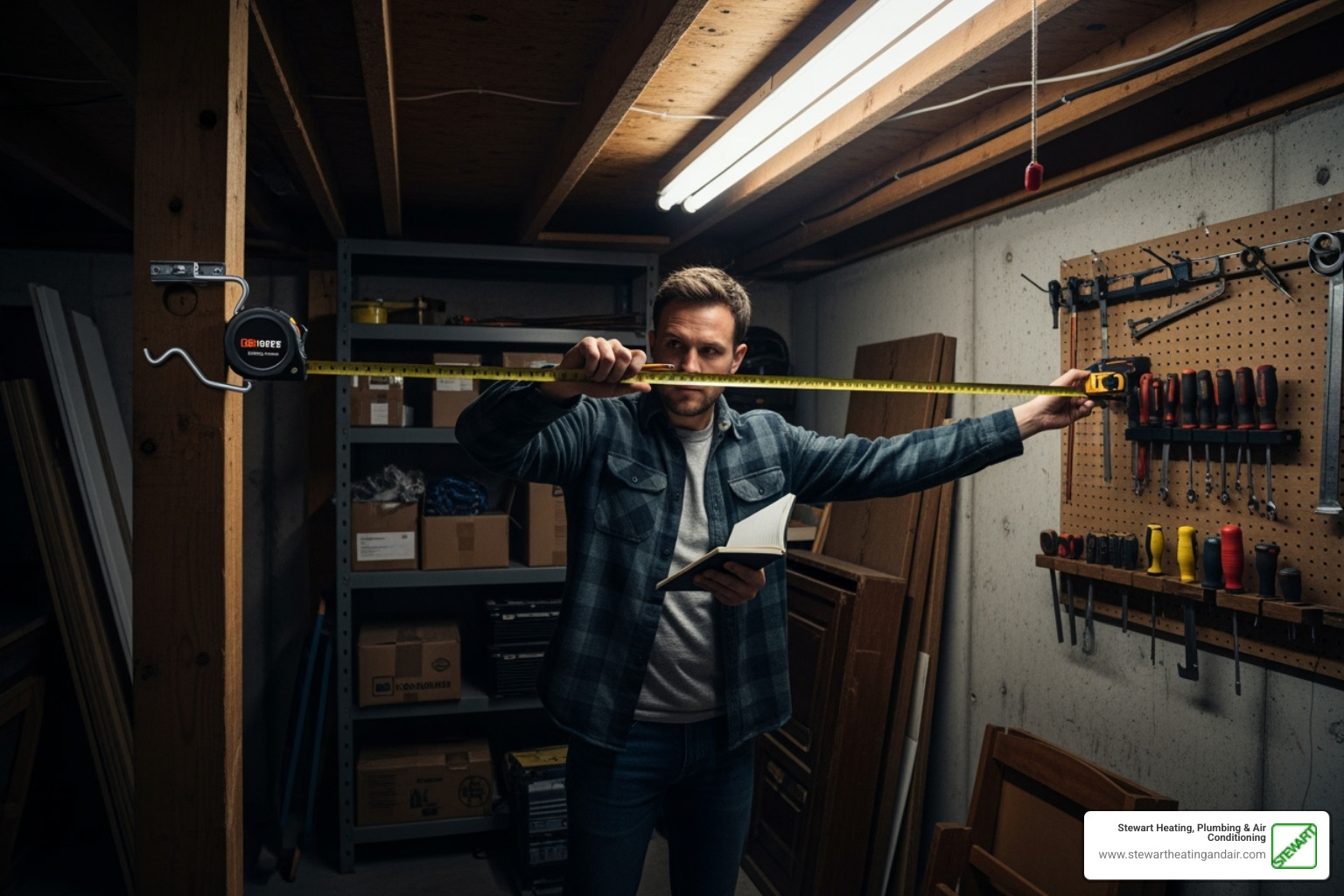
When we help homeowners in Pittsburg, CA, and across Contra Costa County, we always look at several factors: the available installation space, your family's hot water capacity needs, how the unit will perform in our local climate, and what smart features might improve your daily life.
Sizing and Space Requirements
Choosing the correct tank capacity (gallons) is crucial to ensure you never run out of hot water. We typically consider your household size and peak hot water usage. While a 50-gallon unit might suffice for 2-4 people, larger families (5+) might benefit from 65-gallon or 80-gallon models. If you're switching from a gas water heater, you might even consider upsizing slightly, as heat pump water heaters have different recovery rates.
Installation location is also vital. For optimal efficiency, heat pump water heaters should be installed in interior spaces that remain between 40° to 90° F year-round. They also require adequate air space around the unit, typically around 1,000 cubic feet, to allow for proper airflow and heat extraction. This means they perform best in open areas like garages, basements, or utility rooms, rather than small, enclosed closets. If space is limited, some models operate with as little as 450 cubic feet, and split systems are also an option.
During hot and humid times of the year, a fantastic bonus is that the water heater can help cool and dehumidify the space it's installed in – a little extra perk for your basement or garage!
For more detailed guidance on sizing your heat pump water heater, we've got you covered: More info about selecting the right heat pump size
Understanding Efficiency Ratings and Climate Performance
When shopping, always look for an ENERGY STAR certified heat pump water heater. These products have been independently certified to meet strict energy efficiency guidelines, ensuring you get a high-performing and energy-saving appliance. The Uniform Energy Factor (UEF) is your go-to metric for comparing models; the higher the UEF, the more efficient the unit.
A common question we hear is, "How do heat pump water heaters perform in colder climates?" The good news is, today's HPWHs are highly efficient and effective, even in colder environments like ours, as most are placed indoors where surrounding air temperatures are typically above 40 degrees Fahrenheit. While extremely low ambient temperatures (below 38°F) can cause the unit to rely more on its backup electric resistance elements, increasing energy use during those months, their hybrid system reliably and efficiently produces hot water in both warm and cold climates. They are designed to operate effectively across a wide ambient operating range, with some models designed to meet Northern Climate Specs.
What to Look for in a Modern Heat Pump Water Heater
Modern heat pump water heaters come packed with features designed to improve convenience, efficiency, and safety. Here are some key features and technologies to look for:
- Smart Controls and WiFi Connectivity: Many models now feature built-in Wi-Fi and companion apps (like Rheem's EcoNet) that allow you to monitor energy usage, adjust temperature settings, and switch between operation modes from your smartphone. This means you can easily activate "Vacation Mode" when you're away, saving energy without a second thought.
- Leak Detection & Auto Shutoff: This is a game-changer for peace of mind. Integrated leak detection systems (like LeakGuard or LeakSense) can detect even small leaks and automatically shut off the water supply to prevent costly water damage. Some systems can limit leaks to as little as 20 ounces of water – talk about protection!
- Demand Response Ready (CTA-2045 Port): Some models come with an EcoPort, allowing them to connect with utility demand response programs. This can enable you to save even more by allowing your utility to slightly adjust your water heater's operation during peak energy demand, often in exchange for incentives.
- Duct Ready Designs: For installations in smaller spaces or where you want to exhaust cooler air to a specific area (like a hot attic in summer), some models are designed to be "duct ready," offering greater installation flexibility.
- 120V Plug-in Models: For homes without a dedicated 240V outlet, or for easier gas replacement, 120V plug-in heat pump water heaters are now available. These reduce installation barriers and can be a fantastic option.
When you're ready to explore these modern marvels, we can help you steer the options. More info about heat pump installation in Contra Costa County, CA
Understanding the Investment: Costs, Incentives, and Long-Term Value
Let's be honest – when you first look at the price tag of a heat pump water heater, you might experience a bit of sticker shock. Yes, they typically cost more upfront than your standard electric or gas water heater. And yes, installation might involve a few additional considerations. But here's the thing: focusing only on the initial cost is like judging a book by its cover.

The real story unfolds over time. Those higher upfront costs get balanced out – often quickly – by dramatically lower monthly energy bills. When you factor in the available rebates and tax credits (which we'll dive into shortly), plus years of energy savings, a heat pump water heater often becomes the most economical choice you can make.
We've helped countless families in Pittsburg and throughout Contra Costa County make this transition, and the feedback is consistently positive. Once homeowners see their first few energy bills after installation, the value becomes crystal clear.
Are there rebates for a heat pump water heater?
This is where things get exciting! The government – both federal and local – really wants to help you make energy-efficient choices. And they're putting their money where their mouth is.
Federal tax credits are the big headline here. Since January 2023, you can claim 30% of your total purchase and installation costs as a federal tax credit, up to $2,000 per year. This credit runs through December 31, 2025, so there's a generous window to take advantage of it. For many families, this alone can cut their out-of-pocket costs by hundreds or even thousands of dollars.
But wait, there's more! State and local incentives vary by location, but many areas offer additional rebates or tax breaks for energy-efficient appliances. Here in California, these programs are particularly robust.
Local utility rebates are another piece of the puzzle. Many utility companies serving our area offer substantial rebates for installing high-efficiency equipment like heat pump water heaters. These can range from a few hundred to over a thousand dollars, depending on your utility company and current programs.
The key is knowing where to look. The Product Finder — ENERGY STAR Certified Heat Pump Water Heaters website has a helpful rebate finder tool. When you work with us, we'll also help you steer these opportunities – it's part of our commitment to making sure you get the best value possible.
Maintenance Needs for Your Heat Pump Water Heater
Here's some good news: maintaining a heat pump water heater isn't complicated or expensive. Think of it like caring for a reliable family car – a little regular attention keeps everything running smoothly for years.
Air filter cleaning is your main regular task. Just like your refrigerator, your heat pump water heater pulls air from its surroundings to extract heat. Over time, dust and debris naturally accumulate on the filter. A quick check and cleaning (or replacement) once or twice a year keeps efficiency high and prevents unnecessary strain on the system.
Condensate drain maintenance is another simple but important task. As your unit extracts heat from the air, it also removes moisture, creating condensation that needs to drain away. A quick peek to ensure the drain line stays clear prevents water buildup issues.
Beyond these basics, we recommend periodic professional tune-ups – typically every couple of years. Our technicians can inspect the anode rod (which protects your tank from corrosion), check all electrical connections, and ensure every component is working as it should. This proactive approach not only extends your heat pump water heater's lifespan but also maintains those impressive energy savings you're counting on.
For a deeper dive into keeping your system running at peak performance, check out our comprehensive guide: More info about preventative heat pump maintenance tips
Frequently Asked Questions about Heat Pump Water Heaters
Over our years serving homeowners in Pittsburg, CA, and throughout Contra Costa County, we've noticed the same questions come up time and again about heat pump water heaters. Let's address the big ones that are probably on your mind too.
How long do heat pump water heaters last?
Here's some great news: a typical heat pump water heater has a lifespan of 10-15 years, which is similar to or even slightly longer than conventional tank water heaters. The key to reaching that upper range? Regular maintenance.
Most manufacturers back their confidence in these units with 10-year warranties, which gives you a solid indication of their expected durability. We've found that homeowners who stay on top of simple maintenance tasks - like cleaning the air filter and scheduling occasional professional tune-ups - often see their units perform reliably well into that 15-year range.
Think of it this way: you're not just getting a more efficient water heater, you're getting one that's built to last just as long as traditional models, but with much lower operating costs throughout its lifetime.
Do heat pump water heaters make a lot of noise?
This is probably the question we hear most often, and it's completely understandable. Nobody wants a noisy appliance disrupting their daily life.
The reality is that heat pump water heaters do make some noise - they produce a sound similar to a modern refrigerator or a small window air conditioner. We're talking about 45-60 decibels, which is about as loud as a normal conversation or light rainfall.
While they're not completely silent like traditional electric water heaters, the noise is generally unobtrusive, especially when installed in a garage, basement, or utility closet where most water heaters live anyway. Many of our customers tell us they quickly forget the unit is even there.
If noise is a particular concern for your situation, we can discuss placement options during installation to minimize any impact on your daily routine.
Can I replace my gas water heater with a heat pump model?
Absolutely! This is actually one of the most impactful upgrades you can make for your home's energy efficiency and safety.
Switching from gas to a heat pump water heater typically involves capping the existing gas line and either running a new 240V electrical connection or choosing one of the newer 120V plug-in models. The 120V options have made this transition much easier for many homeowners.
This switch is a key step in what's called "home electrification" - moving away from burning fossil fuels inside your home. When you make this change, you're eliminating indoor combustion entirely, which means no more concerns about carbon monoxide or gas leaks from your water heating system.
We handle this type of conversion regularly, and it's often simpler than homeowners expect. Plus, when you factor in the energy savings and available rebates, many families find the switch pays for itself faster than they anticipated.
Conclusion
After exploring everything from the ingenious technology behind heat pump water heaters to their impressive cost savings and environmental benefits, one thing becomes crystal clear: this isn't just another appliance upgrade. It's a smart investment that keeps giving back through lower energy bills, improved home comfort, and a smaller carbon footprint.
The numbers speak for themselves. With efficiency rates up to four times higher than traditional electric water heaters and potential annual savings of $550 or more, a heat pump water heater typically pays for itself within just a few years. Add in the federal tax credits, state incentives, and utility rebates, and the financial case becomes even more compelling.
But beyond the dollars and cents, there's something satisfying about making a choice that benefits both your family and the environment. By moving heat instead of creating it, these systems represent a step toward energy independence while eliminating the safety concerns that come with gas-fired appliances. No more worrying about carbon monoxide or gas leaks – just reliable, efficient hot water.
At Stewart Heating, Plumbing & Air Conditioning, we've seen how heat pump water heaters transform our customers' experiences. Our focus on quality installation and customer satisfaction means we take the time to help you choose the right system for your specific needs, whether that's a compact unit for your utility closet or a high-capacity model for a busy household.
We've been proudly serving homeowners throughout Pittsburg, CA, and Contra Costa County, building our reputation one satisfied customer at a time. Our commitment to doing every project right the first time means you can trust us to handle your heat pump water heater installation with the expertise and care it deserves.
Ready to start enjoying the benefits of efficient, eco-friendly hot water? We're here to guide you through every step of the process, from selecting the perfect unit to professional installation. Contact us for expert water heater services and find why so many of our customers recommend us to their friends and neighbors.





